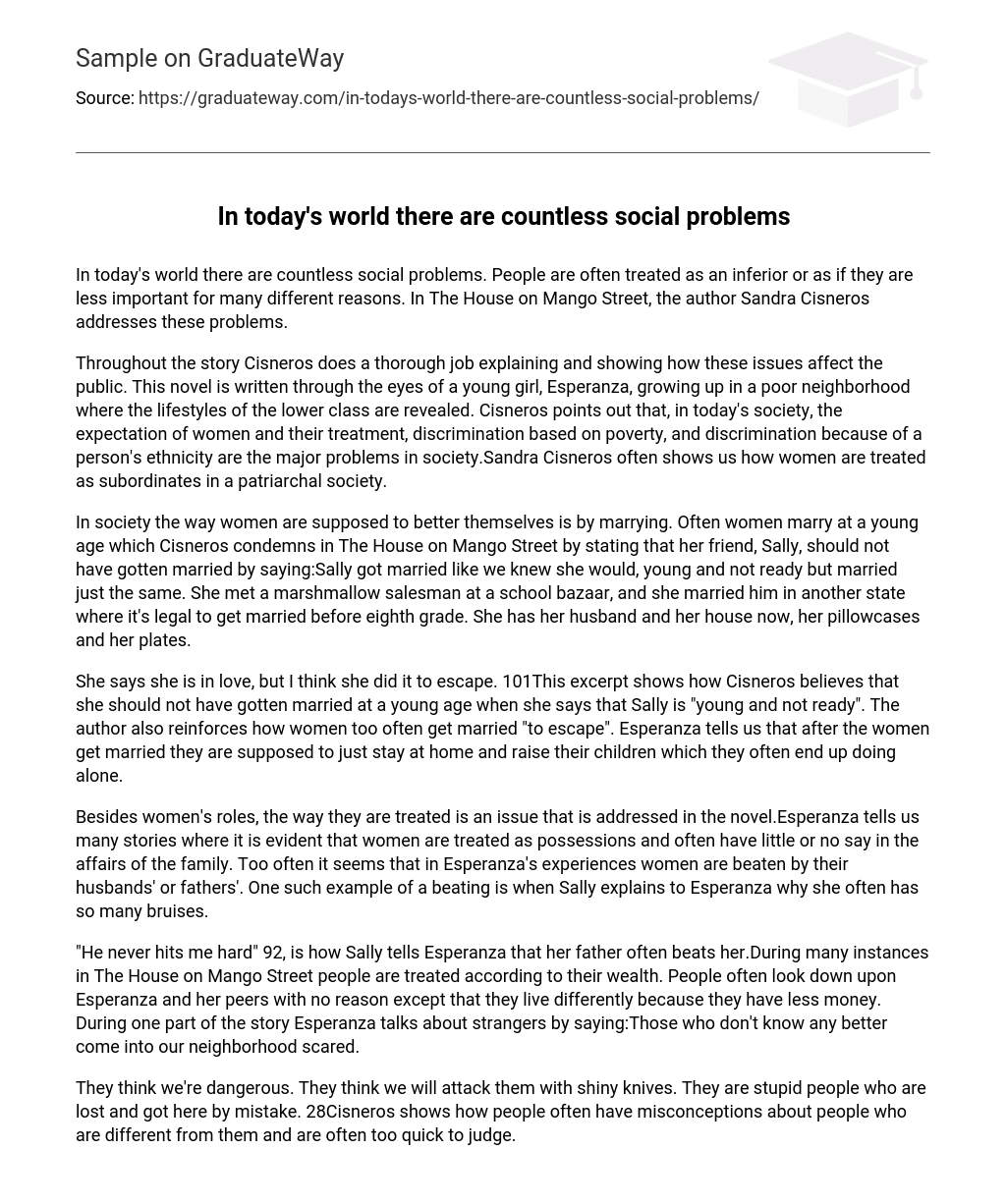In The House on Mango Street, author Sandra Cisneros addresses the countless social problems present in today’s world, where people are often treated as inferior or less important for various reasons.
Throughout the story, Sandra Cisneros effectively illustrates the impact of these issues on society. The novel introduces us to Esperanza, a young girl experiencing life in a disadvantaged neighborhood, where the struggles of the lower class are exposed. Cisneros highlights that contemporary society is plagued by the marginalization and mistreatment of women, discrimination due to poverty, and bias against individuals based on their ethnicity. By portraying women as subordinates in a patriarchal society, Cisneros provides powerful insights into these pressing societal problems.
In The House on Mango Street, Cisneros criticizes the societal expectation that women can only improve their lives through marriage. She specifically addresses the early marriage of her friend Sally, expressing disapproval by stating: “Sally got married like we knew she would, young and not ready but married just the same.” Cisneros goes on to reveal that Sally met a marshmallow salesman at a school bazaar and married him in a state where it is legal to marry before eighth grade. Sally now has a husband, a house, as well as her own pillowcases and plates.
According to Cisneros, Sally’s claim of being in love is viewed by the author as an attempt to escape. In this excerpt, Cisneros expresses her belief that getting married at a young age is a mistake, as depicted by her statement that Sally is “young and not ready”. Cisneros also highlights the frequent occurrence of women entering marriage as a means of escape. Esperanza reveals that these women are expected to remain at home and raise their children, often doing so by themselves.
The novel acknowledges the issue of women’s roles and the way they are treated. Esperanza shares stories that show how women are treated as possessions and have little or no control within their families. Sadly, Esperanza’s experiences often involve women being physically abused by their husbands or fathers. This is exemplified when Sally confides in Esperanza about the numerous bruises she often has.
According to Sally, her father frequently beats her but not severely. In The House on Mango Street, individuals are often judged based on their wealth. Esperanza and her peers are often looked down upon simply because they have less money and live differently. At one point in the story, Esperanza describes strangers who are fearful when entering their neighborhood, unaware of the realities.
They have the perception that we pose a threat. They hold the belief that we will assault them with gleaming knives. These individuals are foolish and misguided, having ended up here accidentally. Cisneros’ 28Cisneros challenges the prevalent tendency of people to harbor misconceptions about those who are dissimilar to them, frequently forming hasty judgments.
The concept is reaffirmed when Esperanza converses with a nun who queries, “Where do you live?” The nun inquired. I responded, “There,” motioning towards the third floor. She questioned, “You live there?” I had to divert my gaze to the location she indicated – the peeling paint on the third floor with wooden bars that Papa had installed on the windows to prevent us from falling out.
Did you live there? The way she asked made me feel insignificant. I nodded.
In this passage, it is evident that people tend to discriminate without thought, leading to the suffering and humiliation of individuals in situations similar to Esperanza. Discrimination is often based on race and ethnicity, as portrayed by the thoughts of the characters in the story, highlighting that Hispanics are subjected to worse treatment solely because of their Hispanic background.
One example of this mentality is seen when Hispanics such as Esperanza and her family are relocating to Mango Street and Cathy remarks, “The neighborhood is getting bad” 13. Following this, Esperanza observes, “In the meantime they will just have to move a bit more north from Mango Street, a little further away each time people like us settle in” 13. These two statements indicate that even at a young age, Cathy was raised with discriminatory views. However, frequently the racism operates in a contradictory manner.
People have low expectations of minorities, causing them to engage in behaviors that reinforce negative stereotypes. For instance, Louie, a Puerto Rican, had a cousin who arrived one day driving a luxurious Cadillac. After a few rides, Esperanza recounts, “The seventh time we drove into the alley we heard sirens… initially soft, then growing louder. Louie’s cousin halted the car right where we were and instructed, ‘Everybody out of the car.'”
Then he accelerated the car, turning it into a yellow blur. In the blink of an eye, a cop car zoomed into the alley at the same high speed. This quote illustrates that in their society, individuals frequently made poor choices, but their intentions remained noble, indicating they were not inherently evil. Sandra Cisneros ultimately triumphs over the social problems that had burdened her.





